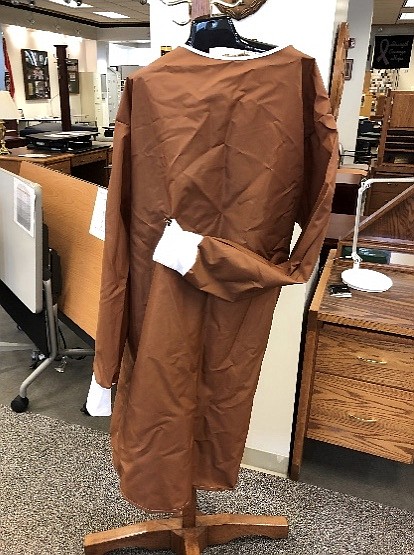[<a href="https://www.newstribune.com/news/health/" style="color:#33AEFF">access the News Tribune Health section</a>]
Jefferson City Correctional Center is among the Missouri Department of Corrections facilities where incarcerated people are helping in the state's response to the COVID-19 pandemic - while DOC also works to keep the disease from spreading within its prison system.
DOC Director Anne Precythe said Tuesday that of the 22 Missouri Vocational Enterprises factories in 12 prisons across the state, three have modified their operations to aid in the response to COVID-19:
The clothing factory at JCCC has developed a prototype to be used to produce 4,000 protective gowns requested by the Missouri Veterans Commission. DOC spokeswoman Karen Pojmann said production of the gowns was not yet underway.
The chemical plant inside Eastern Reception, Diagnostic & Correctional Center in Bonne Terre is making hand sanitizer. "MVE, in conjunction with several private donations, is making 6,800 gallons of alcohol-based hand sanitizer," Precythe said.
She added production began last week, and "we are ready to begin distribution of both gallon and 4-ounce bottle quantities this week."
The prison factory in Cameron has increased its output of toilet paper by 20 percent - that's 600-800 additional cases each week - for a total of 3,500 cases produced each week, or 336,000 rolls. Precythe said the increased production was achieved by adding another work shift.
MVE operates the factories to provide job training for offenders. The manufactured products are sent to government agencies and nonprofit organizations, and Pojmann said no products are sold commercially.
Keeping prisoners and staff healthy
Manufacturing needed supplies is only one facet of DOC's response to the novel coronavirus that causes COVID-19, however.
"Managing communicable diseases in prison is not new. Every year, we prepare for the flu, and are forced to contain and isolate those that are impacted to prevent the spread of the disease," Precythe said.
Pojmann said each prison has a pandemic plan - details about Jefferson City area facilities' plans were not immediately available - and plans for an influenza pandemic have been modified in response to COVID-19, which like the flu is a viral respiratory disease.
Precythe said the modification of plans for COVID-19 has included to identify isolation cells, "potentially a wing within a housing unit - even up to an entire housing unit, if needed."
"Any offender showing signs of the disease will be placed in isolation. A test for the coronavirus may be administered following guidance from medical professionals," Pojmann said.
As of June 30, 2019, more than 6,000 offenders - or 21.5 percent of the prison population within DOC's system - were aged 50 or older, including 855 offenders who were 65 years or older, according to a DOC report that profiled the system's population.
Generally speaking, the older someone is, the more at risk they are from more serious complications of COVID-19, including death.
Underlying medical conditions and being immuno-compromised are also risk factors for more serious complications, and, as of June 30 last year, more than 1,900 offenders required daily nursing or 24-hour nursing services for health issues.
Almost 47 percent of the prison population at the time also was classified as having significant or severe/chronic substance abuse issues, requiring six to 12 months of treatment.
Corizon Health provides offenders' medical care, but DOC is also "working closely with the Department of Health and Senior Services on COVID-19 preparation and response," Pojmann said.
"There are no positive cases of coronavirus in any of our prison facilities," Precythe said of what she knew as of a Tuesday afternoon public briefing with Gov. Mike Parson.
Precythe said, as of Tuesday morning, 18 offenders had been tested for COVID-19 - 13 had negative results, and four test results were pending.
The remaining offender was the positive case DOC announced last week. Precythe said the offender has since tested negative twice for COVID-19 but remains hospitalized for other health conditions.
Two DOC staff members had also tested positive for the disease, she said, adding "neither work in a prison."
Pojmann listed a number of other protective measures in response to the pandemic, including: limited education program class sizes; suspension of all interstate compact transfers; suspension of all in-state transfers, except for "extenuating circumstances;" offender health screenings at intake; temperature screenings of staff, volunteers and vendors; screenings for people attempting to enter a Probation and Parole office; and strict cleaning schedules.
As of March 22, all Missouri Parole Board hearings are also being conducted remotely.
"Hearings that victims have requested to attend may be postponed," Pojmann said.
Probation and parole officers are also using remote work options.
There's no intention of releasing incarcerated individuals because of the pandemic, Parson repeated Tuesday.
Visiting was suspended at all state prisons March 12.
"After 30 days, the department will reassess the situation and make appropriate decisions," Pojmann said.

